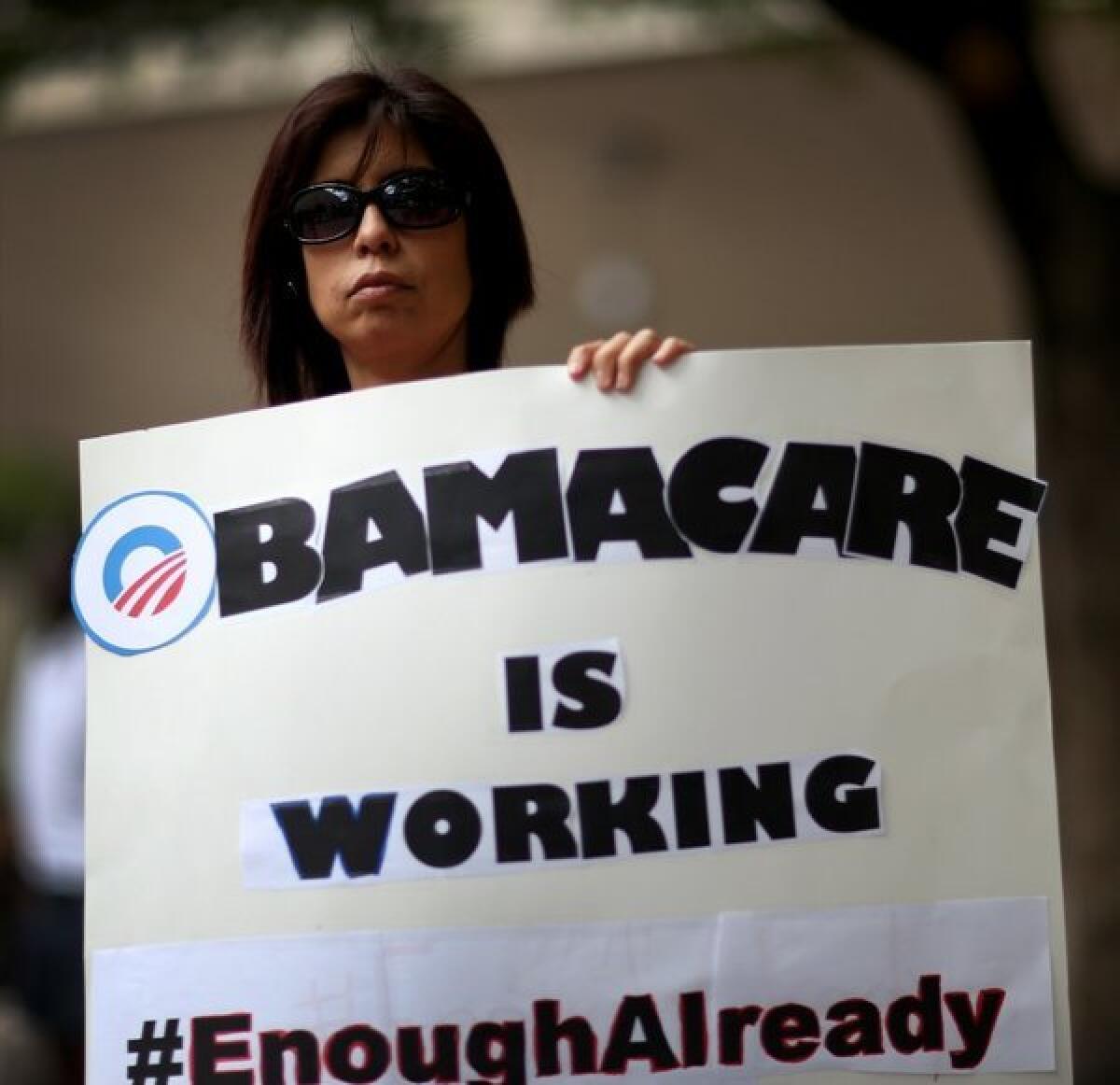Another special interest tries to wriggle out of paying for Obamacare

Now that the medical device industry appears to be on the verge of snaking out from under its Obamacare-related tax, another industry lobby has stepped up to the plate with the words, “Us too!”
We’re talking about the health insurance industry, which has launched a campaign to kill a premium excise tax that will start being collected next year. As with the medical device tax, this is an example of pure special pleading. The Affordable Care Act is shot through with fees and taxes affecting almost all stakeholders in healthcare, largely because conservatives in Congress insisted that the law pay for itself. The health insurance industry simply doesn’t want to carry its share.
On the surface, the health insurers’ arguments make sense. They say the premium tax, which is designed to produce as much as $100 billion in revenue over 10 years, will add 2% to 3% to the costs of premiums in the individual and small-employer markets. (Self-insured policies, which are what most large employers have, aren’t affected.) The industry observes that while the premium tax technically is levied on insurers, they’re sure to pass it on to customers.
“The tax undermines the goal of health insurance reform by making medical coverage more expensive,” says Robert Zirkelbach, a spokesman for America’s Health Insurance Plans, the industry’s lobbying arm.
Yes, but. To begin with, if insurers really thought they’d be able to pass the tax on to consumers dollar for dollar, they probably wouldn’t be squealing so heartrendingly about it. They’re afraid they’ll have to eat some of it themselves to compete on price with each other. That’s not a groundless fear, because one hallmark of Obamacare is that it will enable insurance buyers to make more direct comparisons of the costs and services of rival insurance plans; if you’re passing 100% of the premium tax, you may lose customers to a company passing on only 50%, or 25%.
The insurers’ demand for a repeal of the tax begs the most important question of all: Where do you find the $100 billion it’s supposed to generate? The medical device industry’s demand for a repeal of its tax has the same flaw -- and the device tax is only worth $30 billion.
But just like the device industry, the health insurance industry says that finding replacement revenue isn’t its problem. “We’re focused on the insurance tax,” Zirkelbach said.
Actually, that’s not quite fair. The industry says that the lost revenue could be made up by implementing a sheaf of cost-reduction proposals it unveiled last March and April (the latter in conjunction with several other healthcare groups). These include things like moving away from pay-for-service, in which doctors and hospitals get paid for every test or procedure they order, regardless of how it turns out, and encouraging the formation of Accountable Care Organizations, practice groups that get paid fixed sums to keep their patients healthy.
These kinds of “bold, structural reforms,” as the insurers call them, have certain qualities in common. First, no one disagrees that they’re needed; indeed, most are already being tried. Second, it will be years before any of them yield measurable savings. Third, none of them will do anything to cover the implementation costs of the Affordable Care Act, which include the cost of subsidies to keep individual and small-business premiums low.
Fourth, they don’t include one reform that would really cut costs for consumers -- eliminate the private health insurance industry, which sucks dollars out of the system for no measurable gain, and replace it with a single-payer system. For some reason, that never appears on the insurance industry’s list of top-10 cost-cutting measures.
Every tax in creation hits some people more than others. The drafters of the Affordable Care Act tried to spread the pain around with taxes and fees on device manufacturers, insurance companies, doctors and hospitals, even tanning salons.
And yes, it would be better if the costs of the law were spread among all taxpayers by paying for them out of the general fund. Congress decided not to do it that way. The result is that every stakeholder has its burden to bear. But when one special interest or another claims it’s being uniquely burdened, it’s lying. The costs it wriggles out of will simply have to be shared among the other stakeholders. These efforts to repeal bits and pieces of the health reform’s revenue program are fundamentally dishonest. Repeal them all, or none of them. But don’t give certain industries a break just because they have the best-paid lobbyists.







